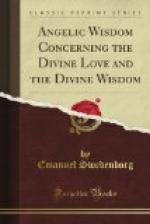165. A dead sun was created to this end, that in outmosts all things may be fixed, settled, and constant, and thus there may be forms of existence which shall be permanent and durable. In this and in no other way is creation founded. The terraqueous globe, in which, upon which, and about which, things exist, is a kind of base and support; for it is the outmost work [ultimum opus], in which all things terminate, and upon which they rest. It is also a kind of matrix, out of which effects, which are ends of creation, are produced, as will be shown in what follows.
166. That all things were created by the Lord through the living sun, and nothing through the dead sun, can be seen from this, that what is living disposes what is dead in obedience to itself, and forms it for uses, which are its ends; but not the reverse. Only a person bereft of reason and who is ignorant of what life is, can think that all things are from nature, and that life even comes from nature. Nature cannot dispense life to anything, since nature in itself is wholly inert. For what is dead to act upon what is living, or for dead force to act upon living force, or, what is the same, for the natural to act upon the spiritual, is entirely contrary to order, therefore so to think is contrary to the light of sound reason. What is dead, that is, the natural, may indeed in many ways be perverted or changed by external accidents, but it cannot act upon life; on the contrary life acts into it, according to the induced change of form. It is the same with physical influx into the spiritual operations of the soul; this, it is known, does not occur, for it is not possible.
167. The end of creation has form [existat] in outmosts, which end is that all things may return to the creator and that there may be conjunction.
In the first place, something shall be said about ends. There are three things that follow in order, called first end, middle end, and last end; they are also called end, cause, and effect. These three must be together in every thing, that it may be anything. For a first end without a middle end, and at the same time a last end, is impossible; or, what is the same, an end alone, without a cause and an effect is impossible. Equally impossible is a cause alone without an end from which and an effect in which it is, or an effect alone, that is, an effect without its cause and end. That this is so may be comprehended if it be observed that an end without an effect, that is, separated from an effect, is a thing without existence, and therefore a mere term. For in order that an end may actually be an end it must be terminated, and it is terminated in its effect, wherein it is first called an end because it is an end. It appears as if the agent or the efficient exists by itself; but this so appears from its being in the effect; but if separated from the effect it would instantly vanish. From all this it is evident that these three, end, cause, and effect, must be in every thing to make it anything.




